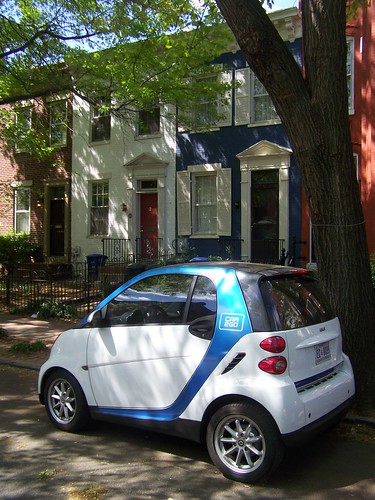Automobile purchases by younger demographics trends upwards
While it is true that the current recession is having significant impact on the pace of new household formation, household consumption, housing purchases, and other expenditures, and this will likely to have long term implications leading to changes in cohort-referent behavior, despite the fact that driving is dropping off amongst all demographics (see the DC Streetsblog post "The Economist: Don’t Expect Driving Rates to Rise Again"), USA Today reports in "New car buying by young rises after years of decline," that younger people are starting to buy cars again.
From the USA Today article:
Young buyers are inching back into the new-vehicle market after several years on the sidelines, helped by easing credit and a slightly improving job market.
"Younger buyers have returned to market at a higher rate than any other age category," according to a recent report by J.D. Power and Associates' Power Information Network.
The young buyer group -- from teen years through age 35 -- is a hefty 23% of so-called retail buyers, the highest since 2008, according to Power. ...
Too soon to call it a solid trend, says Tom Libby, senior auto analyst at Polk: "They're beginning to put their feet back in the water, but we're not near the (normal) level" of 2007.
Says Libby, "One theory is they've just lost interest in new vehicles; they are more interested in being online, connecting that way. If that holds true, we'll never see the number come back."
But Libby believes that's a false reading: "They are as interested as ever,and when economic conditions improve, they'll come back."
That being said, I do agree with the Economist's take ("Seeing the back of the car: In the rich world, people seem to be driving less than they used to") that we are experiencing long term changes in the automobile market, as more people choose to live closer to work, to live in cities, to reduce their dependence on automobility, to use car sharing services instead of owning cars altogether or to own fewer cars, car sales will drop.
While this isn't great for manufacturing, at the same time it increases the success of local communities and local economies, because people will perform more activities, including shopping, closer to home, it increases disposable income, able to be used on more consumer purchases (a good thing since the prices of most goods, especially food, are going up), or on more expensive housing ($10,000 in available income supports between $100,000 and $150,000 of a mortgage), etc.
It also improves US energy security and balance of payments, by reducing the demand for gasolline (more on this general subject later).
Still, well-designed cars like the Kia Soul, Honda Element, and the Mini (I think it drives terribly, use a Mini Zipcar and you'll see for yourself) are designed to appeal to younger demographics, and likely will be somewhat successful in doing so.
 On the other hand, with Zipcar you can drive all sorts of "cool" cars, including a Mercedes, and not worry about insurance, maintenance, and a monthly payment. Car2Go limits you to one type of car, a SmartCar, but for in-city driving, it's fine.
On the other hand, with Zipcar you can drive all sorts of "cool" cars, including a Mercedes, and not worry about insurance, maintenance, and a monthly payment. Car2Go limits you to one type of car, a SmartCar, but for in-city driving, it's fine.Still, as long as car dealerships focus on the hard sell, they aren't going to be making big inroads into younger demographics. For example, the Norfolk Virginian-Pilot reported on how a local dealership, which priced the sale of a car to the customer's advantage, tried to get the customer to sign a new contract paying more. He refused, and they had him arrested. See "Car swap at Chesapeake lot leads to arrest, lawsuits" and "Dealership apologizes for error, customer arrest."
With customer service like that, I would argue that the car industry makes it that much harder to counter long term trends.
Overall, I'd say that the issue is the creation of more micro targeted lifestyles. Rather than with a suburban-centric automobile dependent planning and mobility paradigm shaping most behaviors, attitudes, and planning decisions, now sustainable mobility modes and lifestyles are being treated with greater seriousness and respect and are no longer seen as negative and outsier ways to live.
In such an environment, in the right places anyway, not being dependent on a car becomes the "new normal."
Labels: car culture and automobility, transportation planning




2 Comments:
i was advised by friends to get a title loan but what is their worth as friends?carpooling has been our daily routine and im saving more.
This is a great post.
Thank you for providing such valuable information.
Visit here to know about online medical store-"buy medicine online"
Post a Comment
<< Home